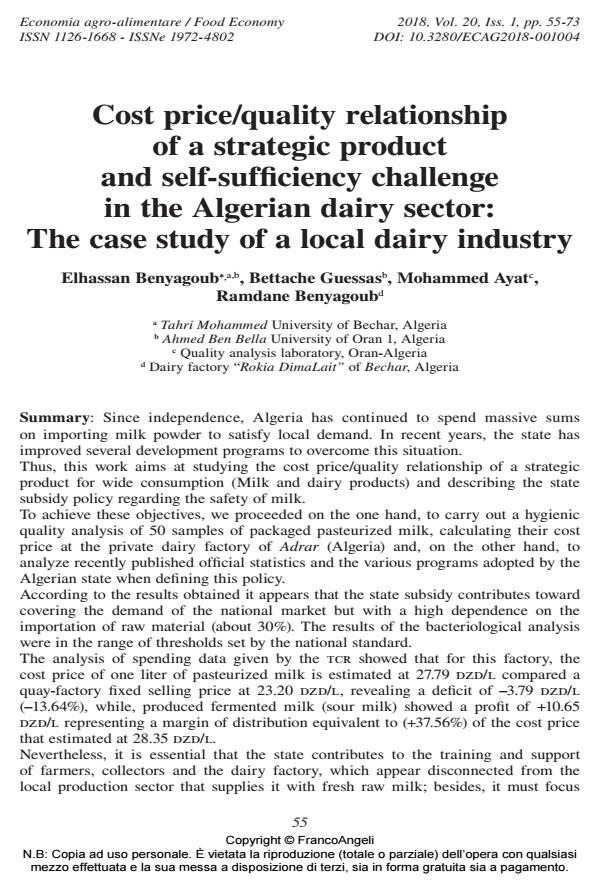Cost price/quality relationship of a strategic product and self-sufficiency challenge in the Algerian dairy sector: The case study of a local dairy industry
Titolo Rivista ECONOMIA AGRO-ALIMENTARE
Autori/Curatori Elhassan Benyagoub, Bettache Guessas, Mohammed Ayat, Ramdane Benyagoub
Anno di pubblicazione 2018 Fascicolo 2018/1
Lingua Inglese Numero pagine 20 P. 55-74 Dimensione file 240 KB
DOI 10.3280/ECAG2018-001004
Il DOI è il codice a barre della proprietà intellettuale: per saperne di più
clicca qui
Qui sotto puoi vedere in anteprima la prima pagina di questo articolo.
Se questo articolo ti interessa, lo puoi acquistare (e scaricare in formato pdf) seguendo le facili indicazioni per acquistare il download credit. Acquista Download Credits per scaricare questo Articolo in formato PDF

FrancoAngeli è membro della Publishers International Linking Association, Inc (PILA), associazione indipendente e non profit per facilitare (attraverso i servizi tecnologici implementati da CrossRef.org) l’accesso degli studiosi ai contenuti digitali nelle pubblicazioni professionali e scientifiche.
Since independence, Algeria has continued to spend massive sums on importing milk powder to satisfy local demand. In recent years, the state has improved several development programs to overcome this situation. Thus, this work aims at studying the cost price/quality relationship of a strategic product for wide consumption (Milk and dairy products) and describing the state subsidy policy regarding the safety of milk. To achieve these objectives, we proceeded on the one hand, to carry out a hygienic quality analysis of 50 samples of packaged pasteurized milk, calculating their cost price at the private dairy factory of Adrar (Algeria) and, on the other hand, to analyze recently published official statistics and the various programs adopted by the Algerian state when defining this policy. According to the results obtained it appears that the state subsidy contributes toward covering the demand of the national market but with a high dependence on the importation of raw material (about 30%). The results of the bacteriological analysis were in the range of thresholds set by the national standard. The analysis of spending data given by the tcr showed that for this factory, the cost price of one liter of pasteurized milk is estimated at 27.79 dzd/l compared a quay-factory fixed selling price at 23.20 dzd/l, revealing a deficit of -3.79 dzd/l (-13.64%), while, produced fermented milk (sour milk) showed a profit of +10.65 dzd/l representing a margin of distribution equivalent to (+37.56%) of the cost price that estimated at 28.35 dzd/l. Nevertheless, it is essential that the state contributes to the training and support of farmers, collectors and the dairy factory, which appear disconnected from the local production sector that supplies it with fresh raw milk; besides, it must focus on typical farms, which seem to be more productive than family small-sized farms. These must come together and form cooperative, not only so as to be in the official circuit but also to be under a hygienic control system in order to avoid any kind of peril to consumer’s health.
Parole chiave:Pasteurized milk, fermented milk, cost price, dairy policy, dairy factory of Adrar
Jel codes:D22, D24
- Removal performance for thermotolerant coliforms and fecal streptococci from dairy effluents by Kenadsa’s natural green clay (Bechar-Algeria) in a fixed-bed column Nouria Nabbou, Elhassan Benyagoub, Meriem Belhachemi, Mustapha Boumelik, Moncef Benyahia, in Applied Water Science 106/2021
DOI: 10.1007/s13201-021-01441-1 - Risk assessment for chemical pollution of dairy effluents from a milk processing plant located in Bechar (Southwest of Algeria) Nouria Nabbou, Elhassan Benyagoub, Abdelkarim Mellouk, Youcef Benmoussa, in Applied Water Science 229/2020
DOI: 10.1007/s13201-020-01309-w
Elhassan Benyagoub, Bettache Guessas, Mohammed Ayat, Ramdane Benyagoub, Cost price/quality relationship of a strategic product and self-sufficiency challenge in the Algerian dairy sector: The case study of a local dairy industry in "ECONOMIA AGRO-ALIMENTARE" 1/2018, pp 55-74, DOI: 10.3280/ECAG2018-001004